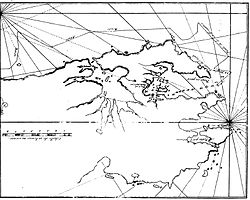Salvador Water: Difference between revisions
Created page with 'thumb|300px|Salvador Water from Teal Inlet thumb|250px|Early mapping of Salvador Water (Dom Pernety, 1769) {{territory|Falkl…' |
mNo edit summary |
||
| Line 1: | Line 1: | ||
[[File:East-Falkland.jpg|thumb|300px|Salvador Water from Teal Inlet]] | [[File:East-Falkland.jpg|right|thumb|300px|Salvador Water from Teal Inlet]] | ||
[[File: | [[File:Salvador Water location FI.svg|right|thumb|250px|Salvador Water in deep blue]] | ||
{{territory|Falkland Islands}} | {{territory|Falkland Islands}} | ||
'''Salvador Water''' or '''Port Salvador''' is a bay | '''Salvador Water''' or '''Port Salvador''' is a bay and inlet on the northeast coast of [[East Falkland]], the largest of the [[Falkland Islands]]. It cuts deep into the land and has an intricate shoreline. It could be described as being shaped like an "M", but that is too simplified a description. | ||
The early French explorers named the bay | The early French explorers named the bay ''Baye Marville''.<ref name="Pernety">Dom Pernety, Antoine-Joseph. ''Journal historique d'un voyage fait aux Iles Malouïnes en 1763 et 1764 pour les reconnoître et y former un établissement; et de deux Voyages au Détroit de Magellan, avec une Rélation sur les Patagons.'' Berlin: Etienne de Bourdeaux, 1769. 2 volumes, 704 pp. [http://gallica.bnf.fr/ark:/12148/bpt6k82173k.pdf Online vol. 1] & [http://gallica.bnf.fr/ark:/12148/bpt6k821758.pdf vol. 2]. [http://books.google.co.uk/books?id=4icAAAAAQAAJ&printsec=frontcover&dq=History+of+a+voyage+to+the+Malouine&as_brr=1#PPA223,M1 Abridged English version].</ref> | ||
Settlements on its shoreline include: | Settlements on its shoreline include: | ||
| Line 17: | Line 17: | ||
During the Falklands War, Salvador Water was considered as one of the potential sites for a British amphibious landing <ref name="Bicheno, Hugh 2006">Bicheno, Hugh (2006) ''Razor's Edge: The Unofficial History of the Falklands War''. London. Weidenfield & Nicholson. ISBN 978-0-7538-2186-2</ref> but, in the event, the landings took place on [[San Carlos Water]] in the west of East Falkland, on [[Falkland Sound]]. Though the Argentines strongly expected Salvador Water to be the landingplace, the Royal Navy water in the event considered it too shallow for larger vessels to enter. Brigadier Thompson is said to have favoured Salvador Water.<ref name="Bicheno, Hugh 2006"/> | During the Falklands War, Salvador Water was considered as one of the potential sites for a British amphibious landing <ref name="Bicheno, Hugh 2006">Bicheno, Hugh (2006) ''Razor's Edge: The Unofficial History of the Falklands War''. London. Weidenfield & Nicholson. ISBN 978-0-7538-2186-2</ref> but, in the event, the landings took place on [[San Carlos Water]] in the west of East Falkland, on [[Falkland Sound]]. Though the Argentines strongly expected Salvador Water to be the landingplace, the Royal Navy water in the event considered it too shallow for larger vessels to enter. Brigadier Thompson is said to have favoured Salvador Water.<ref name="Bicheno, Hugh 2006"/> | ||
[[File:Malouines-Est.jpg|thumb|250px|Early mapping of Salvador Water (Dom Pernety, 1769)]] | |||
==References== | ==References== | ||
{{reflist}} | {{reflist}} | ||
Latest revision as of 22:49, 23 September 2013


Salvador Water or Port Salvador is a bay and inlet on the northeast coast of East Falkland, the largest of the Falkland Islands. It cuts deep into the land and has an intricate shoreline. It could be described as being shaped like an "M", but that is too simplified a description.
The early French explorers named the bay Baye Marville.[1]
Settlements on its shoreline include:
Port Louis, the oldest and one time main settlement on the islands is also nearby, on the other side of a narrow isthmus, which backs onto Berkeley Sound.
Falklands War
During the Falklands War, Salvador Water was considered as one of the potential sites for a British amphibious landing [2] but, in the event, the landings took place on San Carlos Water in the west of East Falkland, on Falkland Sound. Though the Argentines strongly expected Salvador Water to be the landingplace, the Royal Navy water in the event considered it too shallow for larger vessels to enter. Brigadier Thompson is said to have favoured Salvador Water.[2]

References
- ↑ Dom Pernety, Antoine-Joseph. Journal historique d'un voyage fait aux Iles Malouïnes en 1763 et 1764 pour les reconnoître et y former un établissement; et de deux Voyages au Détroit de Magellan, avec une Rélation sur les Patagons. Berlin: Etienne de Bourdeaux, 1769. 2 volumes, 704 pp. Online vol. 1 & vol. 2. Abridged English version.
- ↑ 2.0 2.1 Bicheno, Hugh (2006) Razor's Edge: The Unofficial History of the Falklands War. London. Weidenfield & Nicholson. ISBN 978-0-7538-2186-2
Coordinates: 51°28′11″S 58°24′19″W / 51.4698°S 58.4052°W